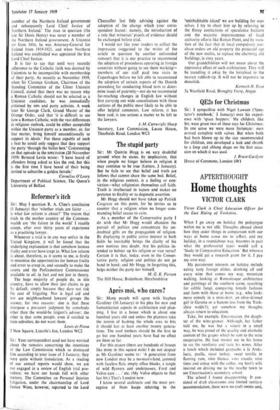Sir: Your correspondent aced not have worried about the rumours
concerning the intentions of the Law Commission which so dismayed him according to your issue of 3 January; they were quite without foundation. As a reading of our annual reports would show, we are not engaged in a review of English trial pro- cedure; we have our hands full with other matters. The Committee on Personal Injuries Litigation, under the chairmanship of Lord Justice Winn, however, reported to the Lord Chancellor last July advising against the adoption of the change which your corre- spondent feared : namely, the introduction of a rule that witnesses' proofs of evidence should be exchanged before trial.
I would not like your readers to collect the impression (suggested to the writer of the article in question by another unfounded rumour) that it is our practice to recommend the adoption of procedures operating in foreign countries without going to see them working— members of our staff paid two visits to Copenhagen before we felt able to recommend the adoption of certain aspects of the Danish procedure for conducting blood tests to deter- mine issues of paternity—nor do we recommend far-reaching changes in English law without first carrying out wide consultations with those sections of the public most likely to be able to offer helpful comments. Law reform, it has been said, is too serious a matter to be left to the lawyers.
J. M. Cartwright Sharp Secretary, Law Commission, Lacon House, Theobalds Road, London WCI


































 Previous page
Previous page